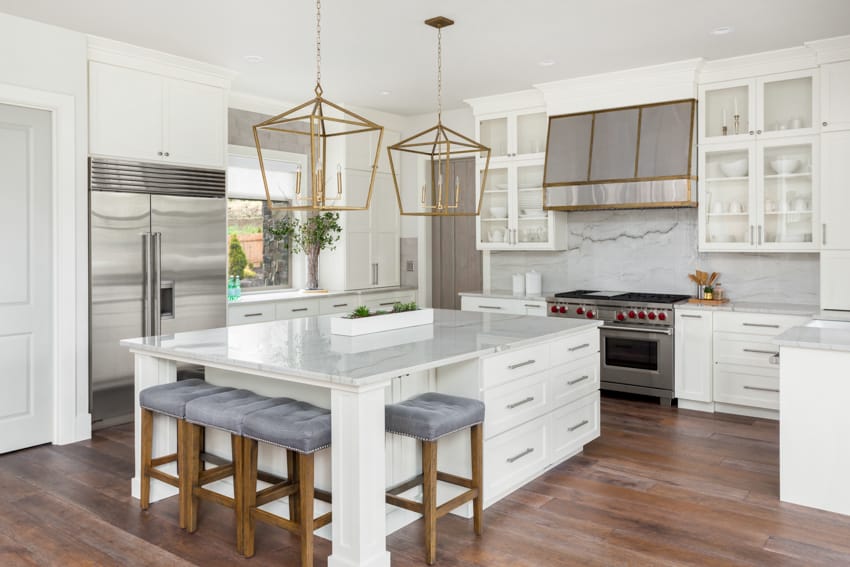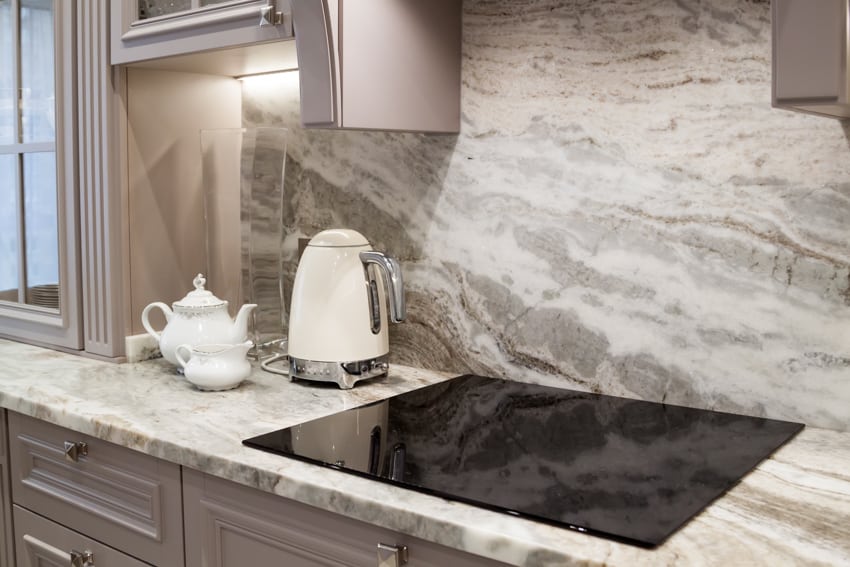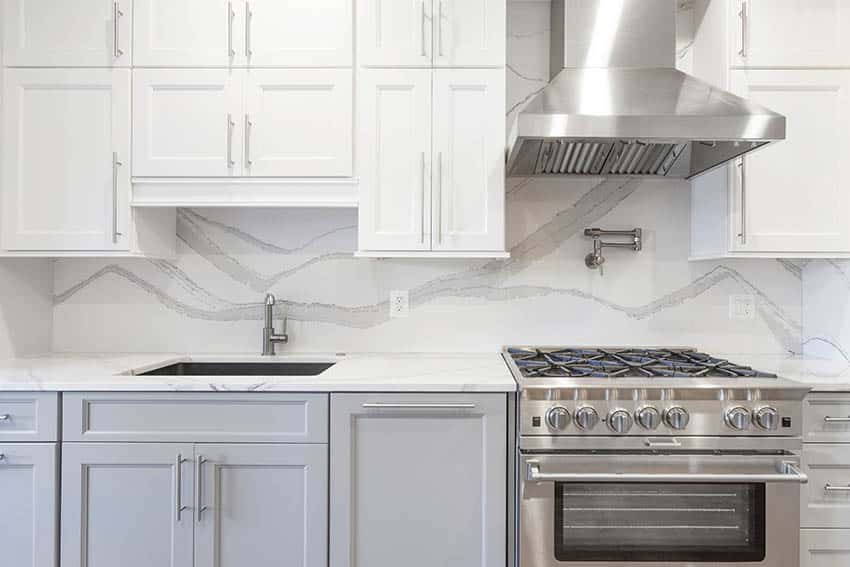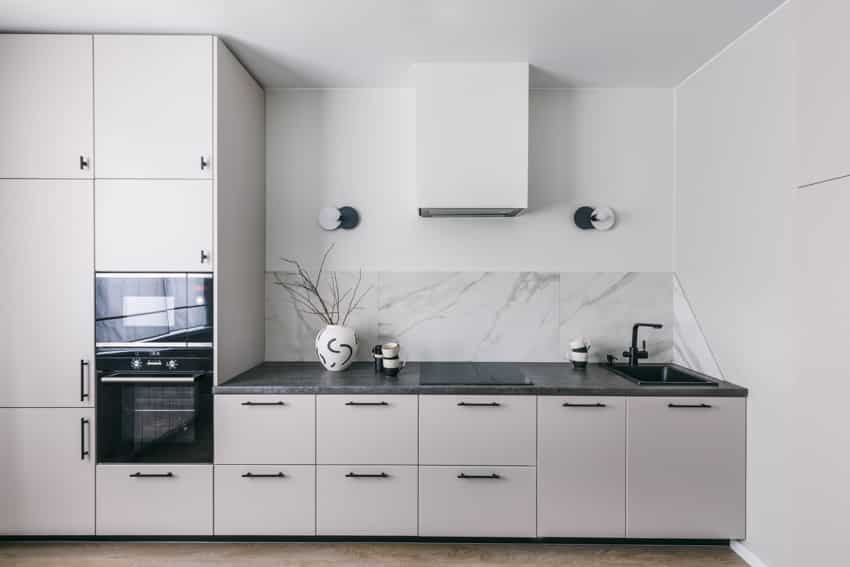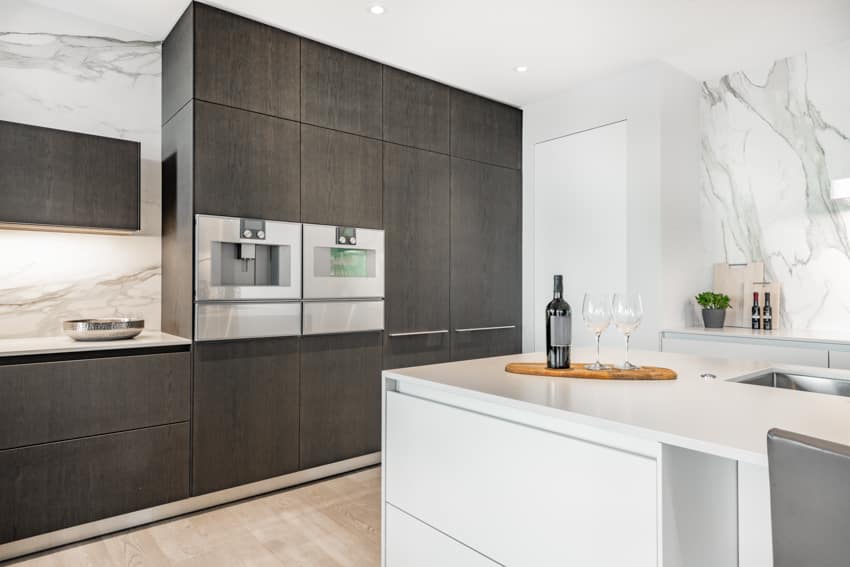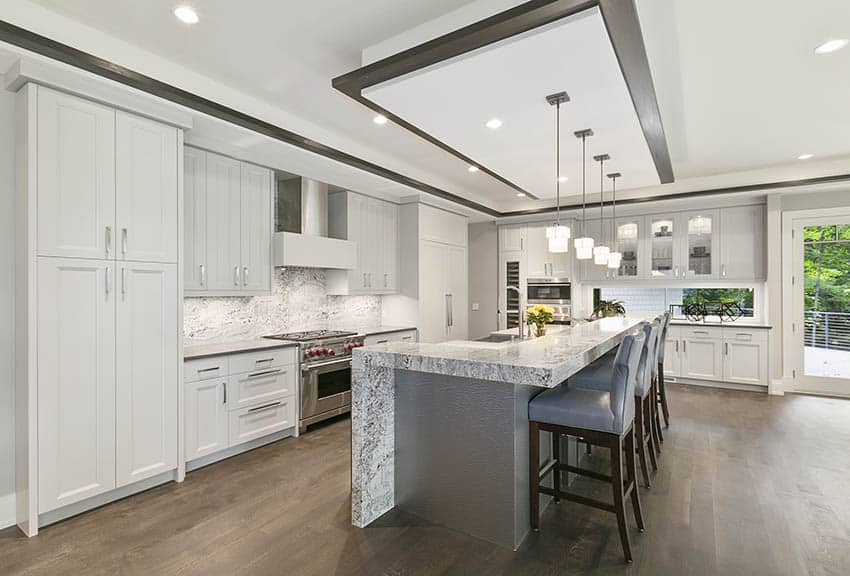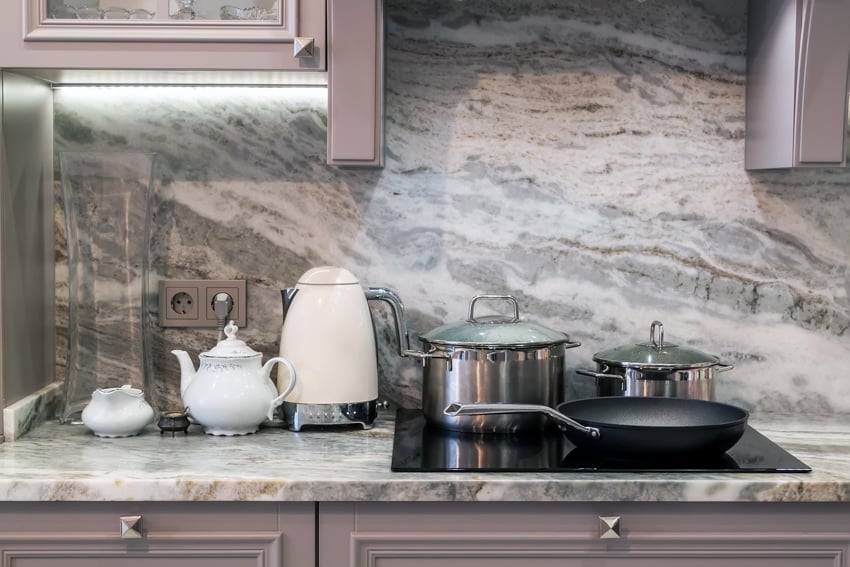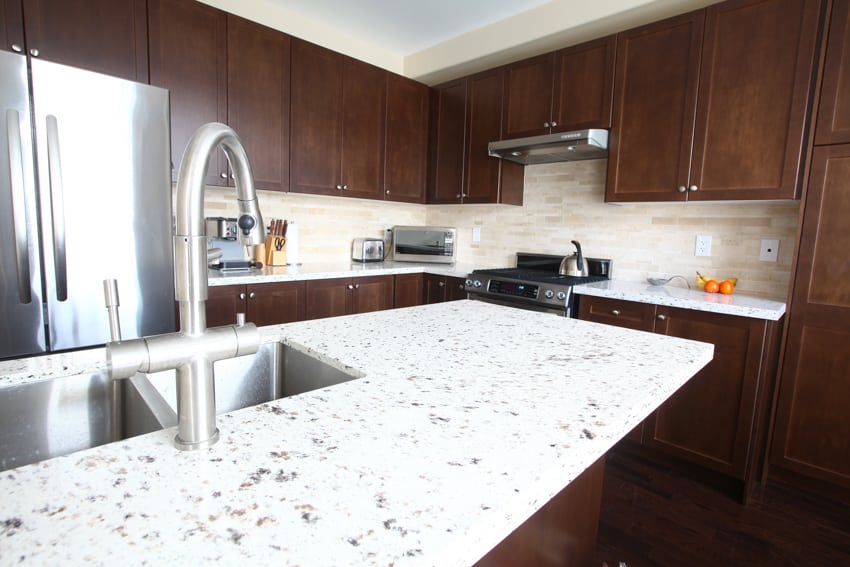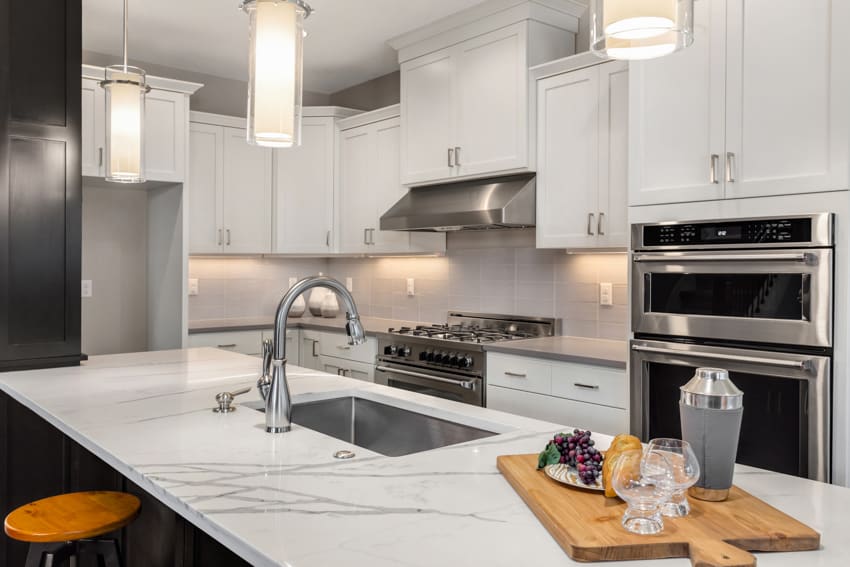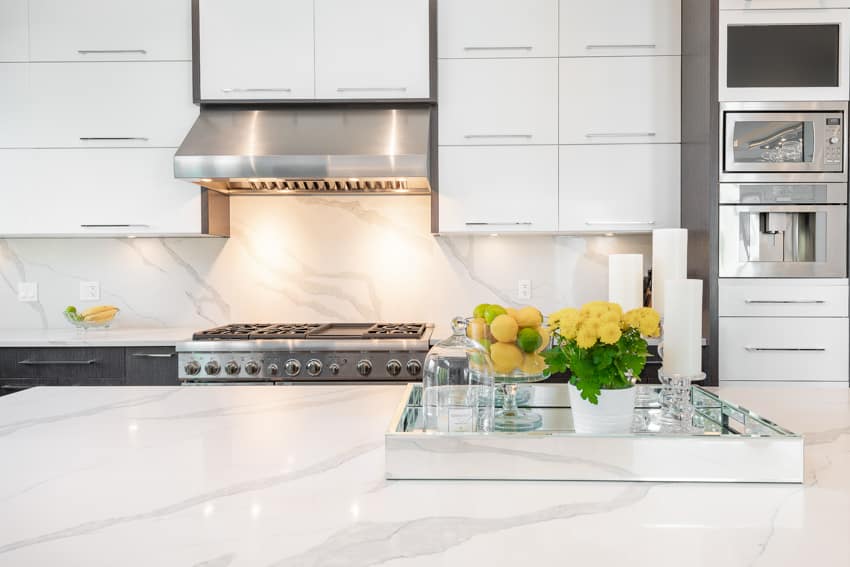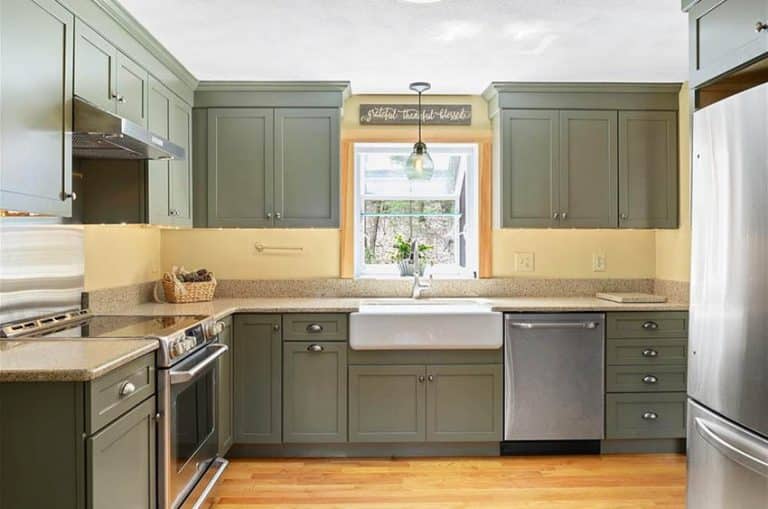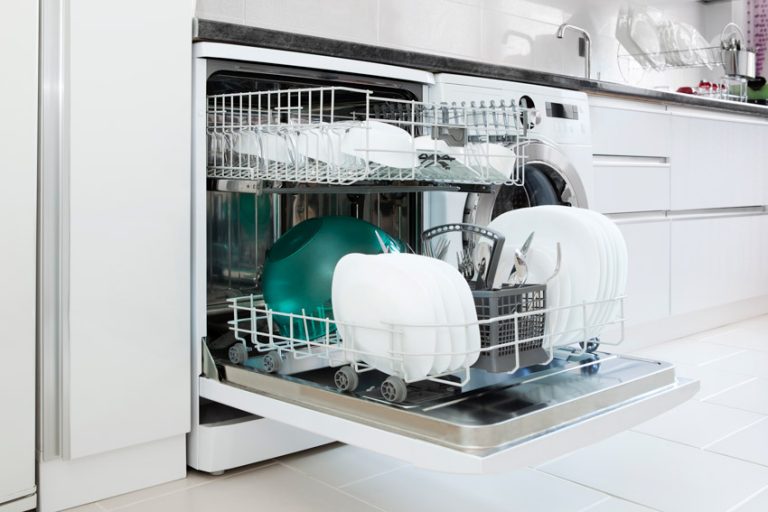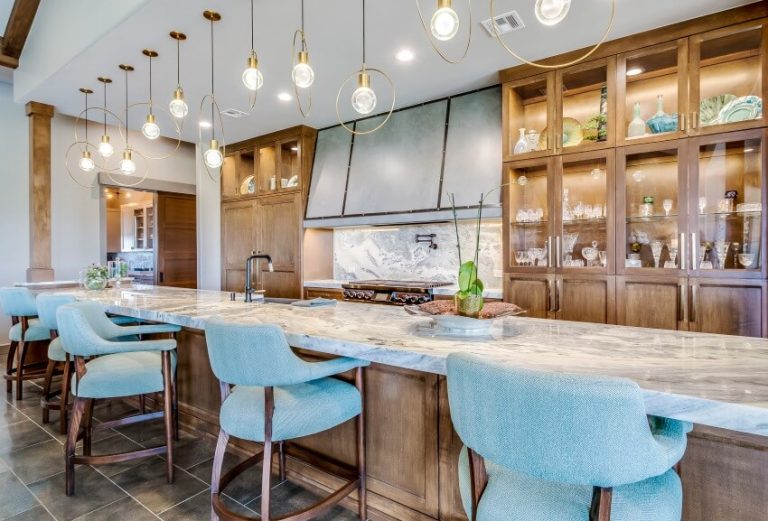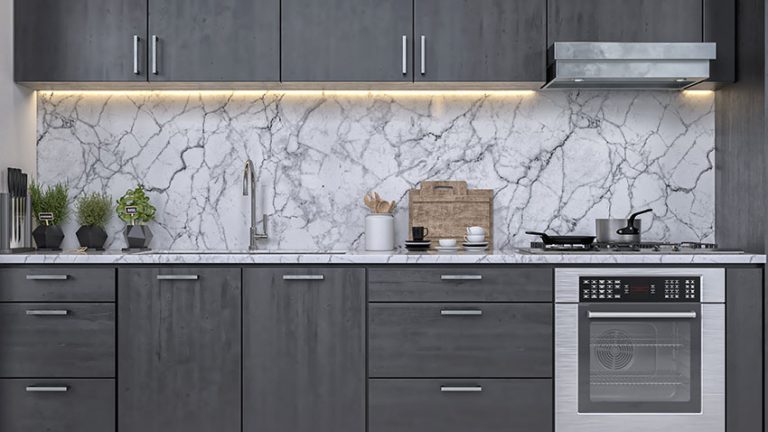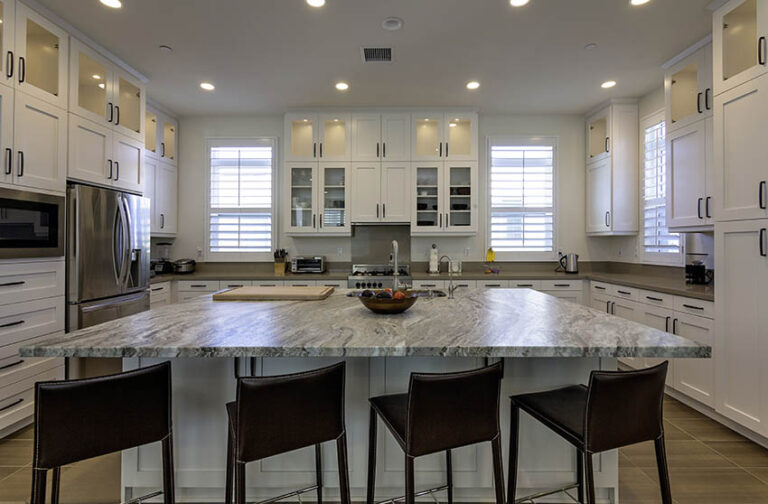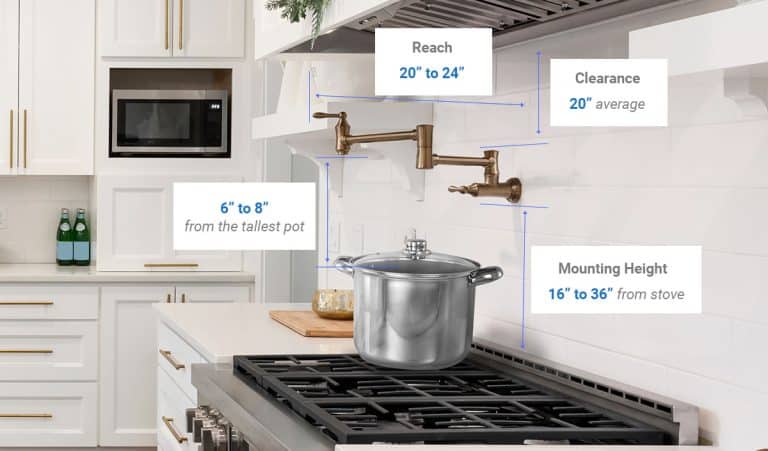Quartz Backsplash Pros And Cons
See the quartz backsplash pros and cons, including design options, reasons for and against, cost, and if it works with the same materialcountertops.
If you’re looking for a good natural stone for your kitchen, you’ve probably heard of quartz and how it took the interior design industry by storm.
Quartz slabs are a type of engineered natural stone. They are made from natural quartz ground into dust, which synthetic binders (polymer or resin) hold together to create a hard surface. Then, pigments are added to achieve the desired pattern.
The material is a designer favorite for kitchens, bathrooms, feature walls, and furniture. Moreover, the beautiful natural stone is typically used as a kitchen backsplash.
In this article, you’ll find out why quartz is such a popular choice.
Is Quartz Good For Backsplash?
There are plenty of areas to use the natural stone on, but you’re probably thinking – will it perform well as a backsplash? Is it a better choice than mosaic tiles? And will it suit contemporary kitchens?
The answers are yes, yes, and yes.
Quartz is best as a backsplash in these situations:
When you have a solid-color countertop: No-pattern counters blend well with the variation and movement on the stone’s surface. Instead of looking too plain, you’ll have an interesting design feature that balances your whole counter area.
When you have a modern kitchen: Having the same material for the backsplash and countertops creates a sleek appearance suitable for contemporary kitchens.
When you have a small kitchen: These stone backsplashes feature a continuous slab, as opposed to mosaic tiles with breaks. Thus, your counter area will look less cluttered and give the illusion of a larger space.
Pros And Cons of Quartz Backsplash
Quartz is not just an aesthetic feature; it also offers several advantages for homeowners. Some factors, however, may become a drawback depending on your intentions for your kitchen.
Pros of Quartz Backsplash
Quartz backsplash is low-maintenance: It is a non-porous engineered stone, meaning it does not absorb dirt and moisture like marble or granite.
Hence, your backsplash does not soak in stains and will generally be easy to clean. Furthermore, it doesn’t require a sealer so there’s nothing to regularly refurbish.
The stone is moisture-resistant: Your quartz backsplash wouldn’t mind the risk of moisture exposure or getting wet altogether.
Its impermeable structure is especially helpful since there is always water exposure in kitchens.
The material leans towards minimalism: A natural stone backsplash means you have a continuous slab transitioning from your countertops. Because they are engineered, the material has a greater capability for seamlessness.
You’ll get rid of broken patterns and grout lines from traditional tile backsplashes, creating a cleaner and simpler look.
This backsplash has a variety of designs: The stone surfaces have subtle patterns that demonstrate elegance and sophistication.
These elements can be delicate veins, freeform shapes, soft colors, or any of their combination.
Has a consistent pattern: The engineered surfaces have consistency in color and pattern, making them more dependable for the overall look and feel than a natural stone with irregular characteristics.
Hygienic surface: Since the surfaces are non-porous, they help prevent bacterial growth, making them a suitable choice for use in the kitchen.
Cons of Quartz Backsplash
Quartz backsplash is affected by UV light: Too much exposure to ultraviolet (UV) light or direct sunlight may discolor the surface.
It may turn pale or yellow, so it is not recommended for outdoor kitchens or sun-drenched rooms.
Quartz is an engineered natural stone: Many do not believe this is a con, but a few homeowners prefer plain or all-natural stone slabs like genuine quartzite or granite. Read more about quartz vs quartzite here.
Price tag: These slabs are more expensive than some other materials but priced less than many natural stone options.
Sensitive to high heat: While the surfaces are durable, they may not be as heat-resistant as other types of natural stone. Discoloration can occur with backsplashes that are installed directly above the stovetop and are exposed to intense heat. In addition, laying hot pans directly against the material may also cause damage problems.
How Much Does Quartz Stone Backsplash Cost?
The cost of solid quartz backsplashes will depend on the design, manufacturer, and quantity you will use.
On average, it starts at $65 per square foot up to $90 a square foot, rivaling marble slab prices. If you requested custom sizes or arrangements, expect around $200 per square foot.
Is Quartz Cheaper Than Tile Backsplash?
With its more attractive designs and significant advantages, this backsplash tends to be more expensive than traditional tiles. You’ll have to factor in the special installation to your kitchen, as well.
While a continuous slab backsplash costs more, remember the little maintenance it requires over the years. You’ll surely find it a wise investment. Read more about a full height quartz backsplash here.
How About Quartz Countertops?
It’s quite common in modern households to use quartz in both backsplashes and countertops. After all, the combination provides a clean and elegant look to your kitchen.
Alternatively, you can opt for just quartz countertops, too. Any option utilizes the attractiveness and durability of the stone.
Here’s a list of its strengths and weaknesses to help you make an informed decision about pairing the stone for both backsplashes and countertops.
Advantages Of Quartz Countertops
Quartz can achieve seamless designs easier: As engineered natural stones, there is more opportunity to work on lessening or eliminating seams.
The slabs have more consistent patterns and uniform edges that work extremely well for contemporary designs, such as large kitchen islands.
Comes in different colors and patterns: It has among the widest range of designs available. You can choose from patterns with subtle veins to more richly textured ones.
The countertop material is antibacterial: It was mentioned above that the stone is non-porous, so it resists excess moisture, water, and stains. In turn, it does not harbor the growth of bacteria and viruses.
They are easy to clean: The material is already resistant to stains, but no natural stone is totally stain-proof. Nonetheless, you’ll find it easy to clean them regularly. All you need is a soft cloth and mild soap, and avoid bleach and abrasive solutions.
The surfaces do not need sealing: Quartz is impervious, so it does not need a layer of sealant material to protect it, unlike granite and marble. You’ll save yourself from the bi-annual to annual necessary sealing maintenance.
Thecountertops are durable.: They are almost level with granite countertops in hardness but are a little more forgiving, so they don’t easily chip and crack. The surface is also highly resistant to scratching.
Disadvantages Of Quartz Countertops
They are not highly resistant to heat: Plain quartz stone is resistant to heat, but the polymers used with it are not. It can withstand around 150 – 200 degrees F.
Extremely hot materials could melt resins and cause permanent damage. You need something to place your hot pots and pans on so you won’t scorch the surface of your countertop.
Quartz fades under UV light: Like with backsplashes, this material is not recommended for kitchen areas exposed to sunlight or UV rays. It will leave your surfaces a yellow hue over time.
The countertops installation requires professionals: While not entirely a disadvantage, professionals must be the ones to install your countertops. Quartz slabs are heavy at around 20 pounds per square foot.
Great precision is also needed to minimize seams. Hence, you better prepare for some upfront costs for the installation.
See more related content in our article about how to choose a backsplash with quartz countertops on this page.

